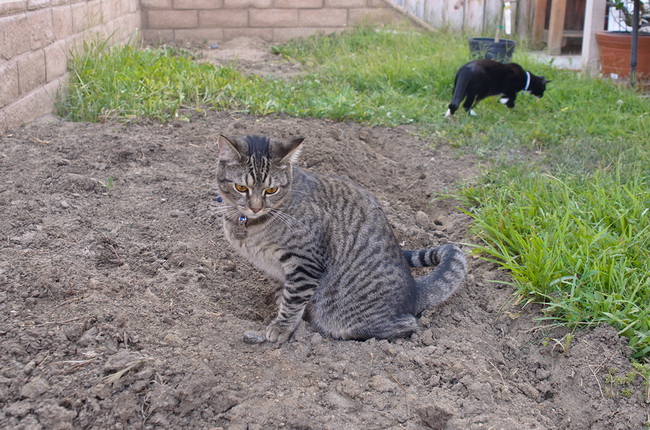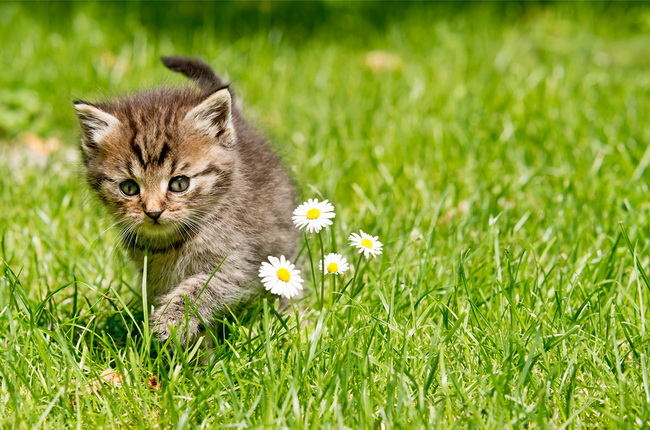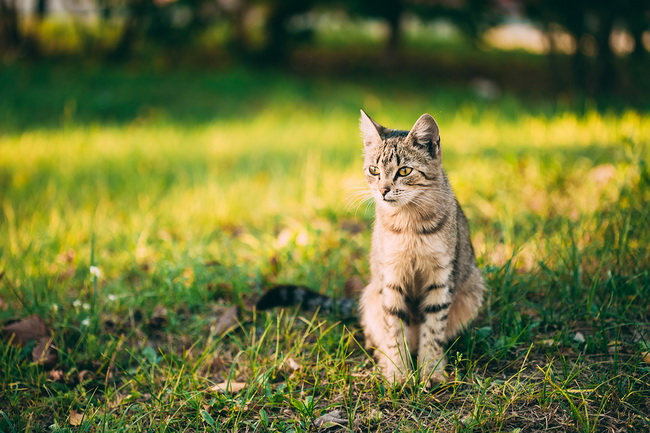- Make It Yourself Lavender Heart-Shaped Bath Bombs!
- 20 Things You Never Knew About “Down There”
- 12 Best Foods For Those Suffering From Arthritis Pain
- 12 Personal Hygiene Mistakes Almost Everyone Makes (Mom Never Told You About #4!)
- 15 Medicinal Plants And Herbs From The Cherokee People
- 12 Mind-Blowing Benefits Of Drinking Coconut Water During Pregnancy
- 12 Outstanding Winter Foods That Won’t Fatten You Up Like A Christmas Turkey
10 Ways To Keep Kitty From Using Your Garden As A Litterbox

Photo credit: bigstock.com
There is nothing more rewarding or relaxing then working in a garden: Eating your own fresh produce, cutting vases full of fresh flowers from your own garden. But what happens when your cat, or a neighbor’s cat, decides that your flower garden or vegetable garden makes the perfect outdoor litterbox?
We love cats, don’t get us wrong, but no one wants the dangers of cat poop in their garden. Yes, cats, especially outdoor cats, can transmit disease through their poop. Cats that might catch wild rodents can pass on parasites through their poop. Also, cat poop itself harbors a pathogen that can lead to a serious disease for humans called toxoplasma. New research has even tied cat poop to schizophrenia and other types of mental illness.
And let’s be honest here: Cat poop stinks. Nothing puts a damper on outdoor activities like stepping on cat poop or digging out weeds and finding one of these little treasures.
Cats are best kept inside, but especially in more rural areas, many people like to let their cats run free to keep away rodents. No point in getting angry at a cat for doing what they have to do — we have to simply convince them to go do their business someplace else!
Want to keep cats out of your garden humanely and safely? We have 10 terrific ways to keep kitty from using your garden as her own personal litterbox.
1. Ultrasonic Pest Repellant
These are nifty little devices that emit a sound that only kitties can hear. This sound is annoying to them, but humans don’t hear a thing. Some of them have a flashing blue light that other animals, such as mice, find scary. Most of these devices work in a 40-square foot area, so if you have a small garden, one of these might be exactly what you need. Some work on batteries, so you don’t even have to worry about running an extension cord!
The problem with these is that if you have a large garden, you will need several of them. At about $40 bucks a pop, this is not a cheap option for those with large gardens.
2. Mulch
Now, cats love some types of mulch as much as your plants do. The trick here is to try things that they don’t like. Cats are pretty fussy about what they walk on, especially when they are scratching to find the right spot to “go.” Sometimes, simply putting stones, such as river rock, is enough to make them go elsewhere. They also do not like sharper types of mulch, such as pine cones.
3. Orange Peels
Cats don’t care for the scent of citrus fruits. This is fairly easy: Start throwing your citrus peels, like the peels from oranges, grapefruits, lemons, and limes, around the garden. If you have mulch, you can mix it in with the mulch. Perhaps the only drawback to citrus peels is that they aren’t especially pretty. If you have some beautiful roses or other flowering plants in your front yard, leaving enough citrus peels around to deter the neighbor’s cat can leave your front yard looking like that cat went through the trash.
Continue to Page 2

Photo credit: bigstock.com
4. Shake-Away
This is a commercial product scented like the urine of predators that cats naturally fear, such as foxes, coyotes, and bobcats. This is a granular formula that you simply sprinkle around your garden. This is completely organic and natural, which makes it safe for pets and small children. It won’t hurt your plants either.
5. Essential Oils
Cats have about 80 million scent receptors, while we have only five million. This means that cats can be very particular about certain scents. They do not seem to like rosemary, citronella, orange, and tea tree oil. Many people report success by mixing about 10 drops of the essential oil of their choice in one cup of water and spraying it around the problem area. This will need to be reapplied after it rains or about every two weeks, so it might cost you a few bucks if the kitty is persistent or if it rains quite a bit in your area. This is another organic solution, however, that won’t harm pets, children, or your plants.
6. Plastic Garden Fencing
No, we don’t mean build a fence around your garden — kitty will probably just climb over it anyway. Instead, use plastic garden fencing, such as trellis or a trellis, and put it in the problem areas. The great thing about using plastic here is that it won’t rust, it won’t splinter, and it won’t fade. You can cut it to fit around your existing plants! If you don’t like the look of plastic fencing, cover it with just enough dirt or mulch so you don’t see it. Once kitty goes to dig, he will find this barrier and quickly go somewhere else to do his dirty work. Yes, you could simply use chicken wire, but this will rust quickly, and its sharp edges can be dangerous.
SEE ALSO: 10 Outrageously Smart Gardening Tips (#5 is Really Clever!)
7. Motion-Activated Sprinkler
This is our favorite. Using infrared technology, motion-activated sprinklers sense heat and movement up to about 35 feet away. Once something steps in range, the sprinkler releases a burst of water, along with a loud noise, that will scare away cats, dogs, deer — probably even burglars! These sprinklers work 24/7, rain or shine, so they are a great option. Most will cover about 1900 square feet, so most people will only need one or two, unless they live on a farm! Perhaps the only drawback to this option is that the noise can be annoying at night (but hopefully kitty gets the picture and doesn’t come back more than once!). Also, if you forget to shut it off, you might find out just how effectively this device can drench you! Like kitty, however, you will probably only forget once!
Continue to Page 3

Photo credit: bigstock.com
8. Black Pepper
There are plenty of products that use this, but you can make your own just as effectively. Simply mix equal parts black pepper (or cayenne pepper) and sand, then throw handfuls around kitty’s favorite spot. A word of warning: NEVER do this on a windy day! You will quickly find out why this repels cats so effectively! Cats always sniff the ground first and once they get a whiff of pepper, they will sneeze their way right out of your yard.
9. Coleus Canina Plant
Sometimes called the “Scaredy Cat Plant” or “the Scaredy Cat Coleus,” you will find this plant available in almost all nurseries or online. It looks pretty, but smells like a skunk. Even more so if someone touches it or crushes a leaf. Cats don’t like this smell any more than we do, so they will go elsewhere. The problem? Who wants a plant that smells like a skunk in their rose garden?
10. Make Friends
Okay, sometimes it’s simply easier to make friends than to fight them. If you make a place for kitty to go, he should leave your garden alone. Get a kids’ sandbox, and plant some catnip plants around one side. Kitty will go check out the catnip, feel happy, and poop in the sandbox — problem solved. You will have to clean the sandbox, but if the offending cat is yours, well, you are probably cleaning a litterbox inside anyway, so what’s the difference? This is not a good option if you have dogs or small children. They will find that sandbox endlessly entertaining as well.
References:
































